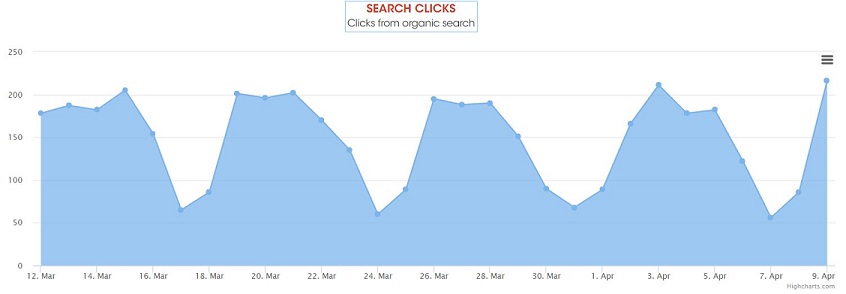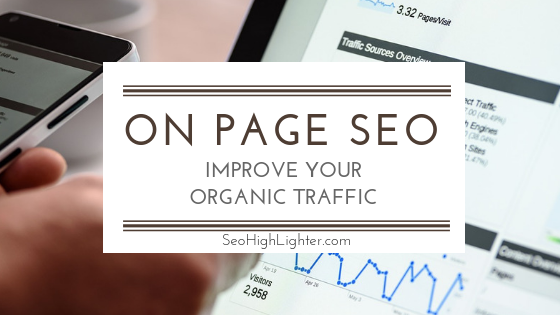Businesses can no longer rely on simply putting up a website. Rather, they have to put in the work to build a real web presence. This web presence depends on SEO and various measures in order to attract visitors and outrank competitors. That’s why both on page SEO and off page SEO are becoming a bigger and bigger deal each day for companies large and small.
What’s The Difference between On Page SEO and Off Page SEO?
SEO, or Search Engine Optimization, utilizes multiple different tactics to help search engines like Google index a website and show it in relevant search engine result pages (SERPs).
Organic traffic is what results from good SEO. This is traffic that comes from visitors finding your website in a search result and end up clicking through to it. Both on-page and off-page SEO are important to garner organic traffic.
To put it simply, on page SEO includes manipulations made directly to your site’s web pages. That might mean producing quality content, structuring it in a specific way, and optimizing the site’s HTML code.
Off page SEO, on the other hand, includes backlink building, social signals, and link relevancy among countless other methods.
The main difference is that a business has full control over their on page SEO, but little control over their off page SEO. Off page SEO generally relies on the behavior of others. What blogs are choosing to link to your website? How many people are liking and sharing your business’ posts?
At the end of the day, influencing both on-page and off page SEO is critical to rank your website properly.
What is On Page SEO?
A search engine will consider multiple characteristics when ranking a web page.
Page Quality
Search engines will consider how users behave on a page when determining its ranking. Do they bounce (instantly click back)? Do they scroll? How long do they stay? Having engaging content will make search engines think of your content as being higher quality.
Keywords
Ultimately, a keyword is what’s going to help a search engine figure out what SERPs are appropriate to show your website in. Using keywords appropriately is therefore very important. However, “keyword stuffing” is no longer effective.
Relevant keywords should be incorporated very naturally into your content. It should also offer real value to readers (refer back to page quality).
Relevancy
You should always be monitoring your site for freshness and ensure that the content, pictures, and videos are still relevant and providing value. They should be relevant to the keywords you are looking to rank for and also the times. If it’s March and you’re still advertising a Christmas sale on your homepage, that’s bad news.
Page Structure
When it comes to on page SEO, HTML tags are the most frequently over-looked factor since they aren’t directly visible to a human who is viewing your website. However, search engines will detect them.
You’ll make the search engine crawler’s job easier if you include optimized HTML code on your pages that include keywords and information to indicate what the content is about. Alt text for images, title tags, and a meta description are among the most important. Header tags are also important.
Do bear in mind that your title tag and meta description will be seen by users on the search engine results page. So, keep it clear, concise, and compelling to rank well and get clicks.
URL Structure
It will be much easier for a search engine to crawl your website, moving from one page to another without skipping any, if you have an organized URL structure. On the other hand, a disorganized URL structure can cause the crawler to hit roadblocks or lead them in circles.
Your URLs should also be organized to make navigation more efficient for human visitors to your site. Your URLs should contain keywords and they should reflect what pages they lead to. URLs should be organized with human visitors in mind. These URLs that are clean and clear are also more inviting to visitors to click.
Internal Linking
Internal links are links going from one page on your site to another page on your site, and they do play a role in your on page SEO. It makes it easier for a crawler to navigate your site and index pages, and it also helps encourage human visitors to stick around and keep reading.
Page Performance
On top of paying close attention to the quality of the content you are producing, you also need to consider the performance of your web page.
Do your web pages take a long time to load? You probably need to optimize your images by shrinking files to the appropriate size. You should also be sure that your entire website is responsive because a slow website will lead to most visitors leaving quickly (bouncing). That’s a factor search engines will give a lot of weight to.

What is Off-Page SEO?
Several off-page SEO aspects will affect your site’s ranking.
Backlinks
Backlinks are, by far, the most important ranking factor when it comes to off page SEO. They have the biggest impact on your site’s ranking, and, luckily, they are somewhat under your control.
A backlink is what occurs where another website has linked to your website. When a trusted, top-ranking website links to your site, that gives your SEO a huge authority boost that search engines love. For instance, if you could get a Forbes article to link to your website, you’d see very positive results from that.
Basically, search engines see backlinks as a sort of endorsement of your website’s content. Oftentimes, smaller websites will end up backlinking your content organically (i.e., without you putting in any effort other than producing good content). Small, high-quality websites and blogs that link to your site can also have a good boost on your SEO.
However, you can also take backlinks into your own hands by:
● Linking your social media profiles to your website
● Writing guest blogs for industry-related websites
● Joining review and directory platforms
● Reaching out to bloggers and web influencers
Domain Authority
This off page SEO factor is less under your control, but it basically is how search engines decide how much to trust your site. The age of your domain name, the history of your domain name, and the amount of referring domains you have are big factors.
Summary
As you can see, there are many factors that affect on page SEO and the amount of organic traffic your website is receiving. Don’t post it and forget it! SEO requires constant monitoring of your traffic, rankings, competition, and keywords.
